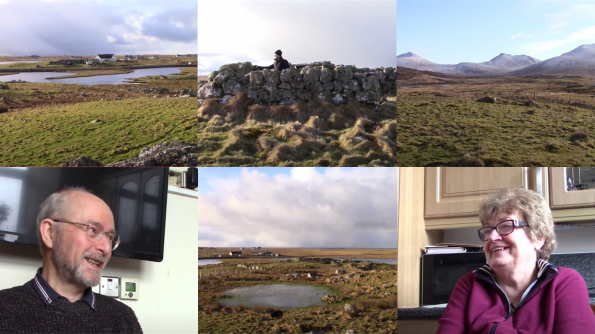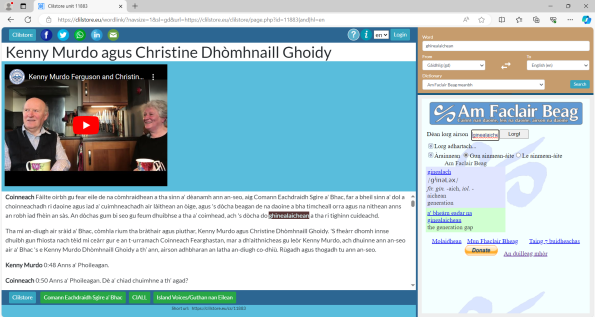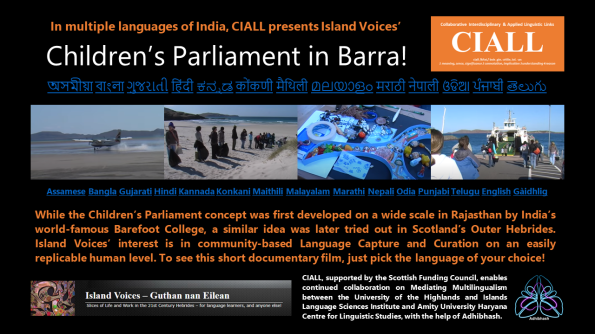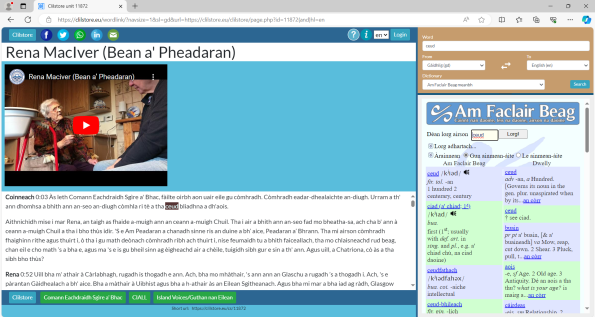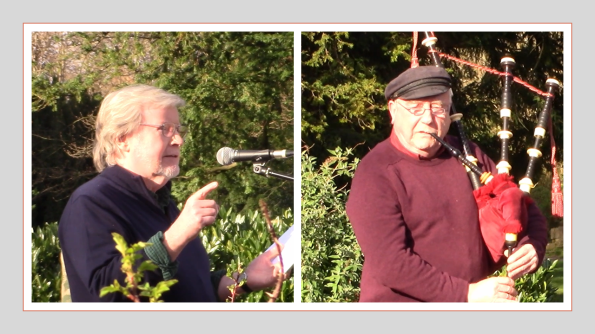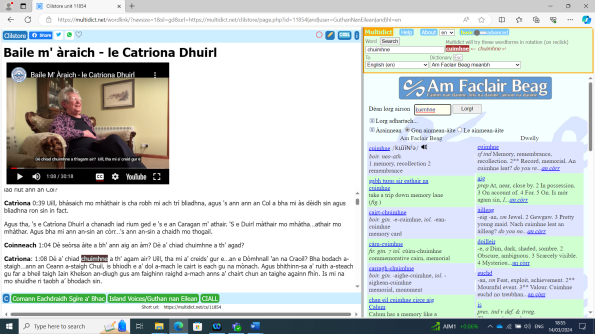Archive
Gaelic in Shetland
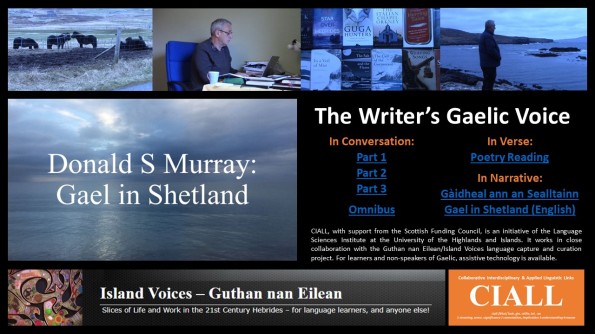 Select any video clip in this landscape format, or use the phone-friendly portrait layout.
Select any video clip in this landscape format, or use the phone-friendly portrait layout.
Lewis-man Donald S Murray is a Shetland resident. As an established writer, mostly in English, how does he keep his Gaelic going while living away from the Ness community where he acquired it?
Following on from our recent “Jamaican in Wales” feature, that’s a key question underlying this second small collection of videos in our Island Voices extension series looking at language use in an “exile” context. Again, we have added poetic recitation to the standard documentary plus interviews format in our Language Capture and Curation model, with the narrative documentary also being reduplicated in English. All films in the collection can be accessed through the above poster in either landscape or phone-friendly portrait layout.
As Donald freely acknowledges, he mostly uses his Gaelic for talking rather than writing, and we’ve duly given greater weight in this package to his conversational voice, though we’re pleased to also platform some of his less well-known Gaelic poetry. While he obviously has many Gaelic speakers in his ever-widening readership, there will also be many non-speakers of Gaelic who, up until now, will only know his “voice” through the written English page. Here he speaks openly and frankly in what he accounts his native language, establishing direct unfiltered contact with his home community in Lewis. At the same time, YouTube subtitling allows others to read his words as he speaks, with the on-off choice of auto-translation into a wide range of other languages, English among them. (Click the Settings Wheel to view the full range and select your own preference.)
The conversation component has additionally been split into three parts, for the benefit of learners or non-speakers of Gaelic, each equipped with optional closed caption subtitles. The “omnibus” edition is intended for those with no need for such assistance.
In Part 1 Donald talks about his family background and upbringing, first in East Kilbride and then in Ness, Isle of Lewis. He also talks about community and school influences and how they affected his acquisition of Gaelic. A spell of work and then university studies followed on the mainland, before he returned to the Western Isles to teach, first in Lewis, and then Benbecula. He also refers to challenges he had to overcome during these stages of his life.
In Part 2 Donald talks about life as a Gaelic speaker in Shetland, noting how he maintains his speaking skills through long-distance conversations and frequent radio interviews. He points out the relative infrequency of his writing in the language as a common feature amongst fluent Gaelic speakers who normally practise their literacy through English, so his writing about his home community is often a process of translation from Gaelic in his head to English on the page. He regrets the lack of theatre-based literary work in the Western Isles, and highlights the value of the short story format in an island community setting. One advantage of living away from Lewis is the greater freedom he now feels to express critical opinion freely.
In Part 3 Donald talks in some detail about the difficulties he encountered in first writing his novel, As the Women Lay Dreaming, and then in talking about it afterwards, often in relation to dealing with varying experiences of trauma at personal as well as community levels. The theme returns in a very different community context in The Salt and the Flame, exploring urban American tensions through Gaelic emigrant eyes. He is thankful for his father’s encouragement of his wide reading interests as a young boy in Ness, which are reflected in the book alongside the wider research he conducted as part of the writing process.
O Parlamento de Crianças
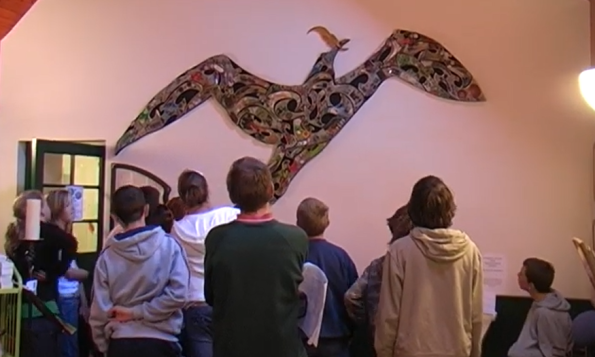 Um pequeno documentário em Português sobre um encontro do Parlamento de Crianças de Uist e da Barra
Um pequeno documentário em Português sobre um encontro do Parlamento de Crianças de Uist e da Barra
At Island Voices we welcome participation and contributions from speakers, learners, and researchers of any age and stage in multiple languages from all over the globe!
Marina Yazbek Dias Peres is a student in the Research Program at Princeton High School, New Jersey, in the USA. In this program, each student learns to research, and conducts their own project over the course of three years. Marina’s research project is focused on “uncovering the motivation behind the preservation of dying/endangered languages, and analyzing the causation behind the lack of their use”.
Marina is bilingual in English and Portuguese, and is also studying French and Mandarin in school. During discussion of her research topic with Gordon Wells she kindly offered to add Portuguese to the Island Voices list of “Other Tongues“, choosing the Children’s Parliament in Benbecula film in Series 2 Generations. We were happy to accept! Perhaps her example will inspire others like her to take an interest and think about participating too?
A wordlinked transcript with the video embedded is available here: https://multidict.net/cs/11930
Alasdair Tuxy – Sgìre a’ Bhac
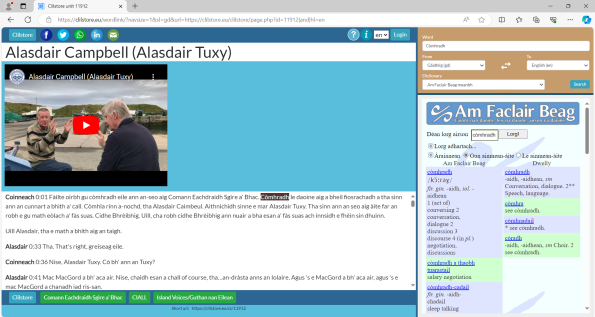
“Fàilte oirbh gu còmhradh eile ann an-seo aig Comann Eachdraidh Sgìre a’ Bhac …”
Alasdair Campbell (Alasdair Tuxy) is interviewed by Coinneach MacÌomhair at Breivig Pier.
And with CIALL assistance, another wordlinked transcript has now been created on the Clilstore platform:
Taighean-tughaidh playlist
Island Voices has created a new playlist on the YouTube video channel for the collection of recordings made about Uist’s taighean-tughaidh – thatched houses. First contributions have come from Tommy MacDonald, telling some of the history from the site of Tobhta Mhic Eachainn and its connection to the “French Macdonalds”, and then quizzing his wife Betty on her memories of being raised in a taigh-tughaidh.
These recordings have been broken up into bite-sized manageable chunks.
In the first two from Tobhta Mhic Eachainn, Tommy presents some stories about Neil MacEachan and his son Alexandre – the “French Macdonalds” – from the remains of Neil’s original house, which was later to be visited by the Duke of Tarentum in an act of filial homecoming following the Napoleonic wars. The video descriptions include links to Clilstore online transcripts for both of these clips, which are also optionally subtitled.
The conversation with Betty comes in four parts. In the first section Betty recalls who built her house (her grandfather), and aspects of her childhood life on the croft, including the herding and milking of the cattle, as well as some of the thatching process as she remembers it.
In the second part Tommy and Betty go on to discuss some of the stiff challenges that would be entailed in keeping a traditional thatched house on a par with modern standards. Talking about the cèilidh culture of earlier times, Tommy recalls how stories would be shared between family members and visitors – some of which remain unexplained to this day.
In the third section Betty and Tommy’s attention turns towards food and drink, and the important place of staples such as eggs and milk – and sometimes rabbit. Services such as electricity and water were a relatively recent introduction. They recall some of the other thatched houses in the area, with a handful having been done up to meet modern standards.
Finally, in the fourth part, Tommy and Betty share memories of more recent times, when a thatched house was converted into a hostel for tourists, under Betty’s mother’s care. In the early days visitors would often stay for weeks, helping out on the croft, and they are fondly remembered. To end, more stories are shared of amusing and perplexing incidents.
Again, Clilstore links are available in the video descriptions, with auto-translatable subtitles an additional option for learners or non-speakers of Gaelic.
The seventh video in the playlist is a longer “omnibus” edition of the Tommy and Betty conversation, which is presented without transcript or subtitles.
With Tommy planning further recordings in the community we can expect more additions to this work in progress in coming weeks, with ongoing CIALL support and in collaboration with the UHI archaeologists based at Cnoc Soilleir.
Jamiekan ina Wielz
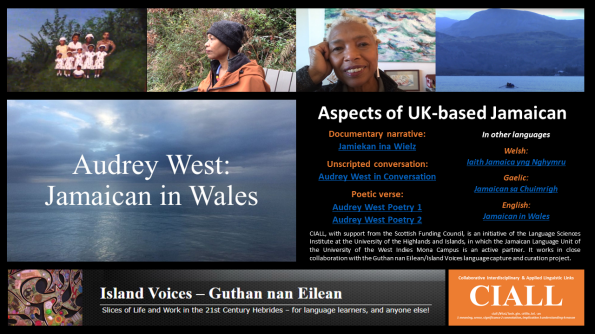 Select any video clip named in this landscape poster, or use the phone-friendly portrait layout.
Select any video clip named in this landscape poster, or use the phone-friendly portrait layout.
Island Voices is extending its “language capture and curation” model, with CIALL support, to new contexts, new genres, and new languages, including the recording of aspects of UK-based Jamaican language use. Gaelic enthusiasts can rest assured this development does not represent a move away from our key linguistic interest in the Outer Hebrides! Far from it, as we engage with other language communities near and far, new opportunities are created for fresh spoken material in video format in Gaelic (and English – and other languages).
We recently filmed Jamaica-born, but London-raised, artist and poet Audrey West at her home in Wales. (Keen followers may well recognise Audrey from her previous contribution to our “Talking Points with Norman Maclean” debates.) We have now created Island Voices-style short video clips in the familiar “documentary” and “interview” formats, while adding a third category of “recitation”, newly included to capture Audrey’s poetry. These films are all listed in the poster above. You can click for either landscape or portrait versions to access live links to any and all of the videos created,
We’re also indebted to Dr Joseph Farquharson from the University of the West Indies Jamaican Language Unit (another Talking Points contributor!), for overseeing the creation of the documentary script in the institutionally approved Cassidy-JLU orthography. Joseph and the JLU team have been extremely busy recently, also providing expert advice to Kingsley Ben-Adir and other cast and production team members for the “Bob Marley: One Love” biopic. As one commenter(!) put it, this YouTube discussion provides “really interesting insights into how skilled linguistic, particularly phonetic, analysis and description can percolate beyond academia and deliver practical applied impact. Bravo JLU!”
This system has enabled regularised subtitling of the clip on sound linguistic principles. Ironically, as YouTube/Google Translate does not recognise Jamaican as a language, we have paradoxically been forced to label the language used in the Jamaican documentary as “English” in order to be able to add the proper Cassidy-JLU subtitles which underline its separate status! We can confidently predict that the YouTube auto-translate function, which we normally commend, is going to struggle with this!
Our aim, in due course, will be to also create a Clilstore transcript incorporating the new Custom Dictionary tool, along similar lines to previous contributions from the Jamaican Language Unit.
We have been demonstrating for some time through “Other Tongues” that the re-purposing in different languages of documentary work in our local community context can be accomplished relatively easily and simply. And we most recently illustrated this at scale with the Children’s Parliament in Barra film. The wider point is that this can be a 2-way street, or perhaps a multi-lane spaghetti junction! With Audrey’s documentary we’ve started with a film made originally in Jamaican and, in a reversal of previous examples, worked up a Gaelic version from it. Not only that, we’ve got Welsh and English versions too!
As hinted in our Duncan Ban MacIntyre piece, “Jamaican in Wales” is just the first of a short series of collections in similar style that explore new fields for Island Voices, including poetic expression, and in “displaced” or “exile” contexts. This is work in progress, with more to come from other island geographies.
Di stuori stil a gwaan. Jos laik Bob Marley se, “Wi faawad in dis jenarieshun chrayomfantli!”
Kenny Murdo ‘s Christine Dhòmhnaill Ghoidy
Kenny Murdo (Rev Ferguson) and his sister Christine are in conversation with Coinneach MacÌomhair in this video from Comann Eachdraidh Sgìre a’ Bhac, with memories of Sràid a’ Bhac, Bùth Bellann and their careers. This “Clilstore treatment” provides an online wordlinked transcript with the video embedded. You can get a translation of any word you don’t know by clicking on it: https://clilstore.eu/cs/11883
Rena MacIver (Bean a’ Pheadaran)
“Over a hundred years old yet still sharp as ever, it was a great privilege to chat with Mrs Rena Maciver.”
Another fascinating conversation from Comann Eachdraidh Sgìre a’ Bhac given the Clilstore treatment: https://clilstore.eu/cs/11872
“Baile m’ àraich” – Catrìona Dhuirl
Island Voices re-posts another video from Comann Eachdraidh Sgìre a’ Bhac on the Clilstore platform, as part of the University of the Highlands and Islands CIALL initiative.
“Coinneach visited Catriona MacCarthur (Catriona Dhuirl), who is in her 90s, although she certainly doesn’t look it. She recalls the days of her youth and being brought up in Coll, reminiscing about people and pastimes, community life and some of the effects which WWII had on her generation.”
You can watch the video while reading the wordlinked transcript in this Clilstore unit: https://clilstore.eu/cs/11854
